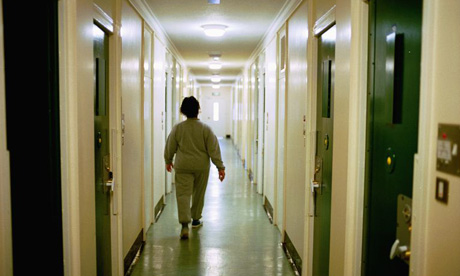
Give prisoners right to vote, says UN
Denial of franchise may infringe human rights
No date set for public consultation, says ministry
By Duncan Campbell
Prisoners in British jails should be allowed to vote and the government should enact legislation to that effect, according to a United Nations report. The call was welcomed yesterday by prison reform groups.
In its latest report on civil rights in the UK, the UN human rights committee has expressed concern that British prisoners do not have the vote and stated that "the general deprivation of the right to vote for convicted prisoners may not meet the requirements" of the UN's human rights covenant. Now pressure is to be put on the government to come into line with the majority of EU countries that allow inmates to vote.
Currently, convicted British prisoners are not entitled to vote, a ban that dates back to the Forfeiture Act of 1870. Many European countries, including Ireland, Spain and the Netherlands, give all their prisoners the right. In some countries, such as France and Spain, judges can impose the loss of voting rights as an additional punishment. Britain is one of only nine European countries, including Russia, Bulgaria and Romania, where all convicted prisoners are banned; in the UK, remand prisoners retain their right to vote.
"The UK ban on prisoners voting is a relic from the 19th century which is neither a deterrent nor an effective punishment," said Juliet Lyon, director of the Prison Reform Trust, yesterday. "The right to vote poses no risk to public safety. Giving prisoners the vote would encourage them to take the responsibilities that come with citizenship."
Lyon added that it would also encourage politicians, particularly those with large prisons in their constituencies, to take more of an interest in penal policies.
The European court of human rights ruled in 2004 that a blanket ban was in violation of the European convention on human rights. The ruling followed an action brought by former prisoner John Hirst. "Until now there have been no votes in jails and so MPs did nothing about penal reform," he said at the time, explaining his reasons for mounting the legal challenge.
In June this year, Bridget Prentice, the parliamentary under-secretary of state at the Ministry of Justice, was asked about the extension of voting rights to prisoners but would only say that any changes in the law would have to be "considered in the context of the wider development of policy on the franchise and the rights that attach to British citizenship".
She added that the government would carry out a "more detailed public consultation on how voting rights might be granted to serving prisoners". The MoJ said yesterday that no date had yet been fixed for such a consultation exercise. Lyon accused the government of dragging its feet and said: "It is disappointing that a government committed to social inclusion has failed to enfranchise all its citizens."
In terms of numbers, the British prison population of approximately 83,000 constitutes what could be a significant voting bloc. If prisoners were enfranchised, they would either be allowed to vote in their home constituencies, in the same way as students, or in the constituency where their prison was. This would raise the intriguing possibility that in a place such as, for instance, the Isle of Wight, which has a high concentration of prisons, the inmates could actually become a crucial voting bloc, able to swing a seat one way or the other.
It is unclear which way the majority would vote or if they would vote at all. The Labour party, which has substantially increased the numbers of inmates since it came to power in 1997, seems an unlikely recipient of votes, although the Conservative plan to provide another 5,000 prison places may not be any more popular.
However, the Conservatives could argue that no other party has had two of its most senior members recently behind bars and that they are therefore best able to identify with the problems inmates face.

Interesting but not much to vote for here anyway - choice is limited.
ReplyDeletejames higham,
ReplyDeleteYou're very negative - Lisbon Treaty cannot be ratified without the Irish vote. Brown's ultimate betrayal of the electorate is not yet complete.
jailhouselawyer,
ReplyDeleteLabour chose to ignore the UN's advice with Iraq, so little or no hope for prisoner's rights in Britain.
jailhouselawyer, "The Reverend Kenneth Glasgow has become something of a saint to many prisoners and former inmates in Alabama, thanks to years of hard work and one lucky discovery.
ReplyDeleteThe one-time convict and drug addict has devoted his post-prison days to helping those still inside regain their voting privileges. And somewhere along the way, he discovered that many of them had never lost it in the first place.
Apparently, in Alabama a criminal only loses his or her right to vote for crimes committed with "moral turpitude." That is, any act that would be considered "immoral" even if it were not illegal. This rules out a great many misdemeanors, but also opens the floor to much debate over morality.
Some might argue, for example, that smoking marijuana is perfectly moral behavior, while others would emphatically argue the opposite. Fortunately for drug offenders -- 3,000 of the 29,000 inmates in Alabama -- state agencies thus far agree that drug possession is not an immoral offense.
Neither the Legislature nor the attorney general has offered a definitive list of crimes that involve "moral turpitude", but the discovery of this loop-hole in the Alabama Constitution has already resulted in registering hundreds of new voters -- with thousands more also eligible.
Nationwide, some 5.3 million people are currently barred from their right to vote, but this discovery by Reverend Glasgow (who happens to be Al Sharpton's half-brother, by the way) might just reinvest some of them with a privilege they'd long given up on ever having again.
This could shape up to be a most interesting election, indeed."
Cheers,
D